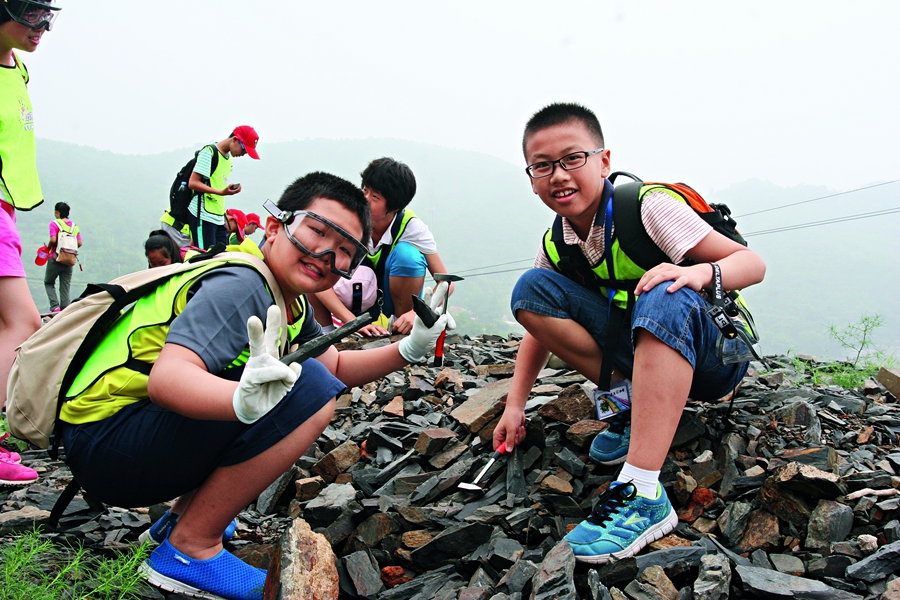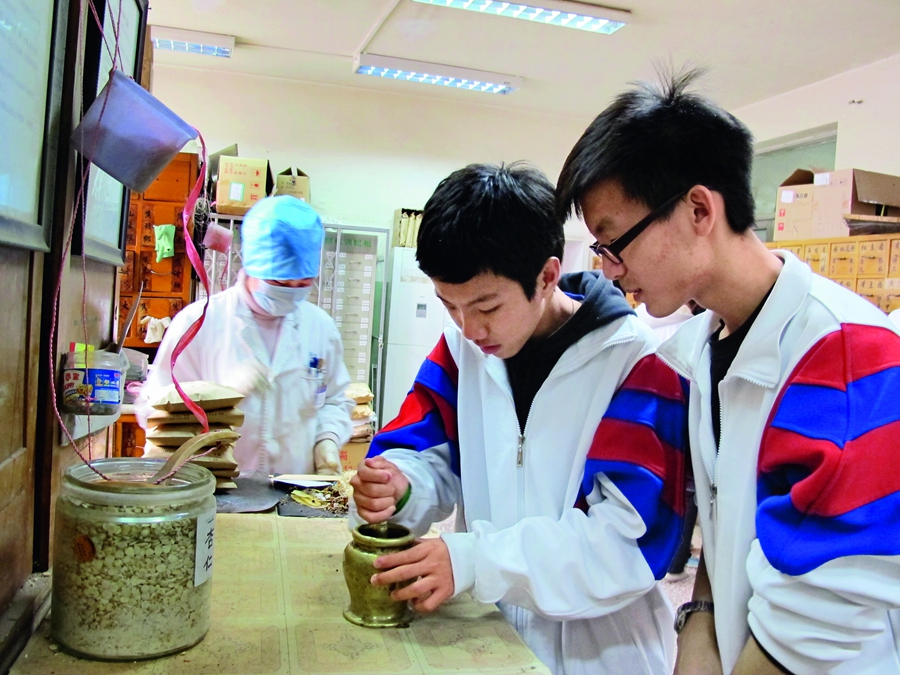By staff reporter LU RUCAI
HAN Juan is a chemistry teacher at Beijing Normal University. Aside from lectures and academic papers, she moonlights as a teacher of experimental chemistry for middle school students. Han’s second job is a part of the college-system curriculum program, or an extracurricular activity launched by Dongcheng District and the Experimental Chemistry Center of Beijing Normal University. The center made its debut to primary and middle schoolers among 21 Experimental Course Bases.
Based on a decade-old notion of “schools without walls,” schools in Dongcheng District have undertaken a college-system curriculum since 2012 to reduce resource gaps between different schools and to explore possibilities of maximizing social resources to improve education. As of now, the college-system curriculum has taken on a “1+N+8+X” framework which breaks down into (1): The Dongcheng Teenagers Institute in charge of overall curriculum design and coordination, (N): Faculties such as the Faculty of Science and Technology, Faculty of Culture and Art, Faculty of International Communication, and Faculty of Social Practices, which have been established successively. They are focusing on designing, developing, and implementing specialized courses, (8): Eight branch schools that design, develop, and implement general courses and occupational courses, (X): Course bases that pool elementary schools, middle schools, and social organizations and enterprises.
Break Down the Barrier to Resources
Wang Yachao, a Grade 13 student of Hongzhi Middle School, took Traditional Chinese Medicine (TCM) as her college-system course. She stated, “I’d like to be able to help preserve the health of my family members. It’s also very likely that I will choose TCM as a future career.”
TCM courses have been taught for several years in Hongzhi Middle School and the TCM lab is adequately equipped with devices for tongue and pulse diagnosis, grinders (for making Chinese herbal medicine), boiling pots, and traditional Chinese herb medicine cabinets. TCM lecturer Yu Zhuonan is a third-year postgraduate from Beijing University of Traditional Medicine (BUTM). She conducted TCM courses at Hongzhi Middle School for over 20 students of varied grades. BUTM also opens TCM courses at the International Department of the High School Affiliated with Beijing Normal University and the Second High School Attached to Capital Normal University.
Students study fossils on a field trip.
“From my perspective, a research-oriented mindset is not easy to nurture. While in practice, I found that some gifted students quickly develop that mindset and are soon able to have independent ideas,” said Yu Zhuonan. Each time she identifies such gifted students, she says she hopes “They would study TCM in the future. I hope my efforts can help them enhance their self-understanding and promote the development of TCM.” Yu Zhuonan would like to impart this research-oriented mindset to students of middle schools so they too could understand the importance of accurate data and logical reporting to research projects.
President Guo Hong of Dongcheng Teenagers Institute remarked that students of different schools can learn courses they are interested in at different venues. For example, Hepingli Fourth Elementary School students can study Digital Art Design and Smart Robots at No. 171 High School. Students from Huiwen First Elementary School can participate in Flower Arrangements, Clothing Design, and ten other occupational courses at Beijing International Vocational Education School. During winter and summer vacations, students can probe into dinosaur fossils in Lufeng County of Yunnan Province. Some courses have even proposed going global—to decrypt DNA in Singapore or to explore the unseen aspect of Australian culture.
At present, over 300 different college-system courses in six major fields ranging from culture and society, sports and health, science and technology, literature and art, international education, and occupational courses, have been available in Dongcheng District, with over 400 teachers helping to guide this project, and 84.2 percent of middle schools and 96.7 percent of primary schools having participated in this project. With these interesting courses, the number of students enrolled in this curriculum have increased year on year with a turnout of 22,000 between 2014-2015 and 64,000 between 2016-2017.
Social Participation
The Experimental Chemistry Center of Beijing Normal University is participating in the college-system curriculum. Han Juan works in the center. More than 10 interesting chemical experiments have been developed for middle schoolers that fall under the subjects of food and agriculture, health and medicine, and energy and transportation. These include extracting iodine from kelp, making solid alcohol, extracting caffeine from tealeaves, and other virtual simulation experiments that strengthen students’ practical skills.
“We make our courses simplified and fun,” said Han. “Personally I believe colleges and universities’ engaging in middle school education is not only conducive, but also necessary. In particular, we would like students to know that chemistry can be fun, hoping they will continue to study it at university.” Teaching middle-schoolers poses quite a challenge for these teachers since they have to teach accurate formulas in an interesting and engaging way.” This set of courses is only open to junior school students now and Han expressed her hope that these courses would become available for older students too.
Among the 21 experimental course bases for middle and primary school students, there are 16 university laboratories including the Fundamental Industry Training Center of Tsinghua University, National Experimental Teaching Demonstration Center of Aerospace Electronic Information of Beihang University, Physics Teaching Demonstration Center of Beijing University of Science and Technology, Environmental Science and Engineering Key Laboratory of Beijing Institute of Technology, and four labs of social organizations including Beijing Chaoyang Circular Economy Industrial Park.
Students in the TCM courses have an opportunity to manually grind herbs.
These labs are only part of the “X” of the program. The Dongcheng Education Commission has truly motivated the society by establishing further access of social organizations. The Beijing-based Guhua Jinyu Culture Co., Ltd. has broadened the interests of students through teaching printing and papermaking technology in their classes. “Before, the course is priced by the content whereas now it is priced in line with students’ ratings. So if students give high ratings to a course and they are willing to join the class, the price of the course will go up accordingly.” Mr. Zhang, a teacher with the company, said. “This will make our company focus more on the quality of teaching,” Zhang added.
The Palace Museum and the National Museum of China are planning to be involved as well. Ms. Fan of the Publicity Department of the Palace Museum stated they conduct courses tailor-made for middle and primary schoolers on exhibitions, antiques, collections or specific themes, teaming up with No. 65 Middle School and No.166 Middle School in Dongcheng District, No. 31 Middle School in Xicheng District, and Shuangyushu Elementary School in Haidian District. The Palace Museum has designed teaching tools like Court Beads DIY Set, Stamp Carving Set, Imperial Robe Origami Set, and so on.
Igniting Students’ Potential
“The college-system course reform aims at training well-rounded and independent students, in hope of formulating a new training model to meet the needs of the times. It aims at forming a student-centered model, a model of inclusiveness, innovation, openness, and dynamic,” Dongcheng Teenagers Institute President Guo Hong said.
People in other countries have recognized education in China an indoctrination process. However, in recent years, reform has been made by educational departments of China to change the exam-oriented education system as well as to enhance education for students’ all-round development. Especially in Beijing and Shanghai, education reforms are changing the landscape faster than ever before. “Take our experiment in Dongcheng District as an example, we advocate the pattern of receiving elementary education in schools and seeking personal development through the college-system courses,” said Guo.
For more accurate positioning and structuring of the curriculum, and more convenient and practical implementation, Dongcheng Teenagers Institute partnered up with the Chinese Academy of Social Sciences (CASS) and Beijing Academy of Educational Sciences to jointly develop and implement the curriculum.
Professor Tian Dewen, director of the Institute of European Studies at CASS, has been working on the reform of its college-system curriculum as an expert since 2016. He has conducted numerous researches, drawing on his experience of studying educational reforms in European countries. He believes that Dongcheng educational reform matches with reforms first pioneered in European countries. The reforms in Finland, Slovenia, and Germany focused on improving elementary education, and promoting research-oriented study and self-motivated study, with abundant participation of social resources that could share and update courses. Tian Dewen said, “Educational reforms in Beijing have begun to cooperate internationally.” He suggested that the open method of coordination (OMC) in the EU could be adopted for systematic construction for an open, standardized, procedural, and measurable elementary education curriculum.
Guo said that the goal is to develop a long-term system to connect universities, middle schools, and primary schools and to charter a complete, practical, and useful course map with resources of academies, schools, and organizations to contribute to the personal development of students, which serves as a unique gift for students on their path of education.

